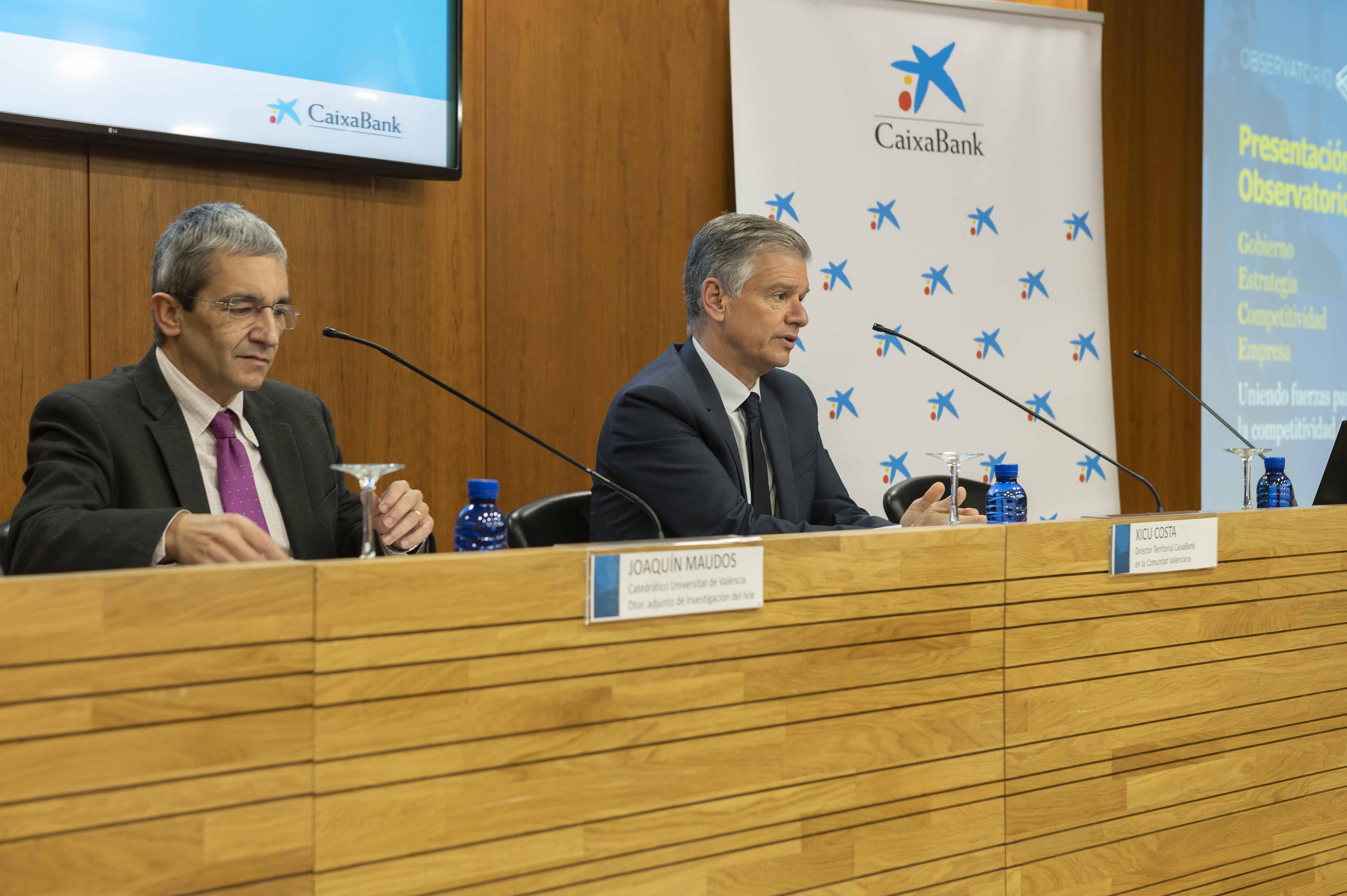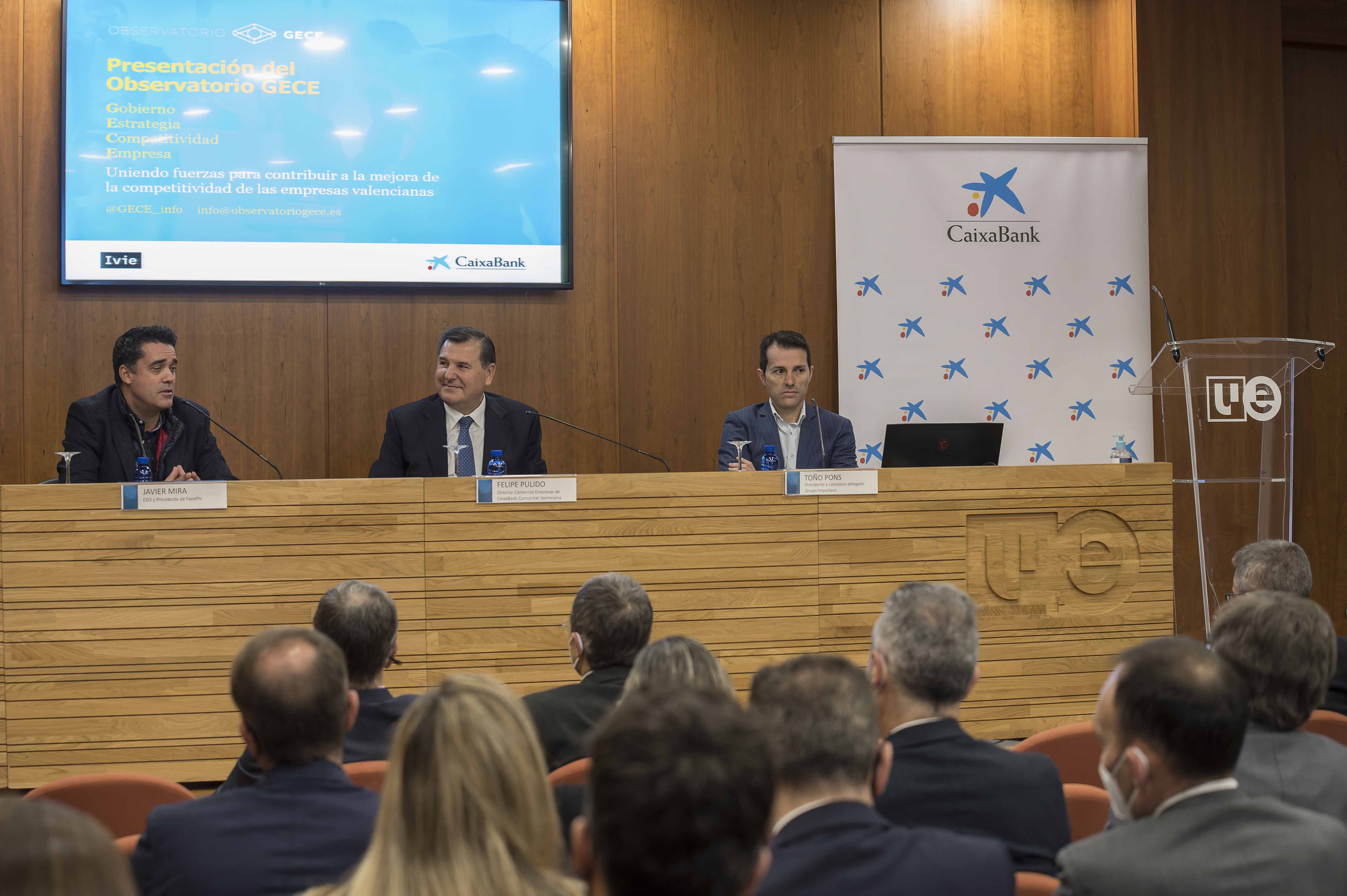On 1 March, the Chair of Family Business (CEFUV) promoted by the Valencian Association of Entrepreneurs (AVE), the School of Entrepreneurs (EDEM), the Valencian Institute for the Study of Family Business (IVEFA), the Institute of Family Business (IEF) and the University of Valencia (UV), and sponsored by CaixaBank and Broseta, participated in the first 2022 report of the GECE Observatory: Engines of recovery: characterisation and features of Valencian companies with high competitiveness and growth, with the presence of IVIE and Caixabank.
The report presented at the conference identifies a group of benchmark companies that can act as a driving force to promote economic recovery and which are characterised by combining a high level of competitiveness with the ability to grow at a rate above the average for their respective sectors.
The presentation ceremony was attended by Xicu Costa, territorial director of CaixaBank in the Valencia Region, and Joaquín Maudos, deputy director of the Ivie. In this presentation, the Territorial Director of Caixabank wanted to emphasize that the commitment of his entity in this project is determined since he considers that an analysis of the business reality results in the creation of wealth, employment generation and social welfare. For his part, Joaquín stressed that "it is essential that we ask ourselves what factors explain low productivity, because only by identifying them will we be able to correct the problem".
Afterwards, Alejandro Escribá, Ivie researcher and coordinator of the GECE Observatory, presented the main conclusions of the latest report by the GECE Observatory. In his speech, he highlighted that 'motor' companies are larger than the average size of their sectors and, in intensive sectors, they have an average turnover of 6 million euros, compared to 5.3 million euros for all companies. In the less technology-intensive sectors, the average size in terms of sales of the motor companies is 6.8 million euros, compared to 4.7 million euros for the total. Likewise, 20.9% are exporters.
"It is essential to know the longitudinal perspective in order to know how companies evolve, and at the same time be able to locate a pattern in the sector" - Alejandro Escribá
Escribá also explained that the GECE Observatory document also analyses the corporate governance characteristics of the most competitive companies capable of growth, with 22% of the technology-intensive sectors' leading companies having a board of directors, compared to an average of 20.2% for all companies. Meanwhile, in the less technology- and knowledge-intensive sectors, 17.4% of the driving companies have a board of directors, 1.2 percentage points above the total number of companies.
|
|

|
After the presentation of the Observatory and the main results of the first analysis of 2022, there was a round table moderated by Felipe Pulido, Commercial Director of CaixaBank Companies in the Valencian Community. On the one hand, Javier Mira, CEO and president of FacePhi, stated that his company is still committed to the development of its technology, which they consider to be one of the most secure and complete in the world; On the other hand, Toño Pons, President and CEO of Grupo Importaco, stressed that "the differentiating elements that have allowed us to grow as a company have been the internal talent and the commitment to specialised knowledge, the focus on quality and innovation".

Finally, the event was brought to a close by Alejandro Escribá, who reaffirmed that the report ensures that the companies, known as the driving force, are a good reference for facing the challenges of digitalisation and sustainability and the opportunities that these offer. For Escribá, "the Valencian Region still has a business reality far removed from these profiles. Therefore, the post-COVID recovery requires a change of perspective in the economic actors, especially in the field of company shareholding and governance systems, so that they are not limiting".
DOWNLOAD RESEARCH NOTE GECE 01-22








